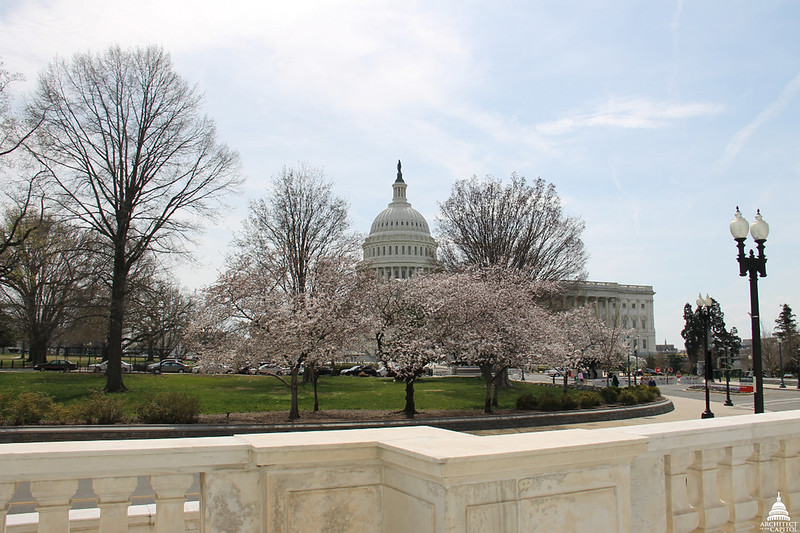The Political Landscape of FISA Reauthorization
On Wednesday, the House of Representatives will mark up legislation to reauthorize and reform key provisions of the Foreign Intelligence Surveillance Act (FISA), which will otherwise expire on March 15.

On Wednesday, Feb. 26, the House Judiciary Committee will mark up legislation to reauthorize and reform key provisions of the Foreign Intelligence Surveillance Act (FISA). The New York Times reports that the bill was negotiated by Judiciary Committee Chairman Jerrold Nadler in cooperation with Adam Schiff, chairman of the House Intelligence Committee, and with Judiciary Committee Republicans. The bill is shaping up to become the primary vehicle through which Congress will weigh in on the nation’s surveillance programs at this critical—and politically charged—juncture.
The FISA provisions at issue were originally slated to expire in December 2019, but Congress passed a short-term government spending bill in November, extending the authorities until March 15. Yet after the December reauthorization, the Justice Department inspector general released its report on the Justice Department and FBI’s handling of the Russia investigation, containing harsh criticism of the FBI’s compliance with procedures to ensure the factual accuracy of surveillance applications submitted to the FISA court. As a technical matter, reauthorization of the specific surveillance tools at issue today has little to do with the “basic, fundamental, and serious errors” detailed in the inspector general’s report, which involve different provisions of FISA. But the inspector general’s report shook the confidence of many lawmakers in the FISA process. With the debate over reauthorization beginning in earnest, it’s useful to review the complicated political landscape.
The current discussion focuses on reauthorization of the following four provisions, which will sunset on March 15 without congressional action:
- The “business records” provision (also known as Section 215 of the USA Patriot Act of 2001, FISA Section 501, or 50 U.S.C. § 1861) permits the government to apply to the Foreign Intelligence Surveillance Court (FISC) to obtain “tangible things,” such as driver’s licenses, records, documents and other items deemed “relevant” to investigations concerning international terrorism, counterespionage or foreign intelligence. This provision became the subject of controversy in 2013, when Edward Snowden revealed that the FISC had interpreted the statute to allow bulk collection of telephone metadata by the National Security Agency (NSA).
- The “call detail record” (CDR) program was created by the USA Freedom Act of 2015, which amended 50 U.S.C § 1861 in response to the Snowden revelations to force the NSA to replace bulk collection with a more targeted program. The statute required the NSA to identify a specific selection term (SST)—a term that “specifically identifies an individual, account, or personal device” like a telephone number—as the basis for the collection of call detail records. The government must show the FISC that there is a “reasonable, articulable suspicion” that a SST is associated with a foreign power or an agent of a foreign power engaged in international terrorism. In addition, the government must show the FISC that it reasonably believes that the CDRs that would be produced will be relevant to the investigation in question. In June 2018, the NSA announced that “technical irregularities” had caused it to collect a large number of CDRs it should not have had access to under the USA Freedom Act. In March 2019, the New York Times reported that the NSA had secretly shuttered the CDR program, an account that then-Director of National Intelligence Dan Coats confirmed in an August 2019 letter to the congressional Intelligence and Judiciary Committees.
- The “roving wiretap” provision (also known as Section 206 of the USA Patriot Act of 2001, FISA Section 105(c)(2)(B), or 50 U.S.C. § 1805(c)(2)(B)) allows the government to continue surveillance of FISC-approved national security targets when the targets take steps to thwart electronic surveillance—for instance, by repeatedly switching their cell phone provider.
- The “lone wolf” provision (Section 6001 of the Intelligence Reform and Terrorism Prevention Act of 2004, FISA Section 101(b)(1)(C), or 50 U.S.C. § 1801(b)(1)(C)) allows the government to surveil a foreign person engaged in international terrorism activities, even if that person does not have a formal connection to a terrorist group or other foreign power.
Elsewhere on Lawfare, Bobby Chesney has provided additional detail on all four authorities and describes what will happen if the provisions expire without renewal.
Although privacy advocates expressed indignation in December that the provisions were extended for three months without robust legislative debate, news of the temporary extension generally flew under the radar, lost amid the excitement about lawmakers thwarting a government shutdown. With the sunset looming again, however, this reauthorization fight may produce more fireworks.
FISA Politics Before the Extension
Disagreement over the reauthorization long predates the inspector general’s report. Since March 2019, privacy and civil liberties advocates have called on lawmakers to use the December sunset as an opportunity to consider major overhauls to the nation’s surveillance laws. In August 2019, Coats staked out the opposite position, requesting that lawmakers reauthorize all four authorities permanently and without reform (known as “clean and permanent reauthorization”).
The daylight between privacy advocates and the intelligence community was evident at a pair of cantankerous hearings before the House and Senate Judiciary Committees early in fall 2019. In joint testimony, representatives from the Department of Justice, the FBI and the NSA echoed Coats’s letter, calling on the congressional committees to “consider permanently reauthorizing these authorities based … on the Government’s demonstrated record and the importance of the authorities to national security.” Republicans and Democrats in both chambers of Congress were skeptical of the government’s requests, especially regarding reauthorization of the CDR program, which Coats had just confirmed that the NSA had wound down. Senate Judiciary Committee Chairman Lindsey Graham, a professed surveillance hawk, joined several of his colleagues on both sides of the aisle—Sens. Dianne Feinstein, Patrick Leahy and Mike Lee—in expressing frustration with the NSA when its representative refused to respond in an unclassified setting to a question about whether the CDR program had “helped” protect national security.
Civil liberties groups, meanwhile, called on lawmakers to terminate some FISA provisions and to condition reauthorization of others on major reform. In testimony before the Senate Judiciary Committee, Elizabeth Goitein of the Liberty and National Security Program and the Brennan Center for Justice urged lawmakers to terminate the CDR program and the lone wolf program, citing the NSA’s compliance issues on the former and the limited utility of the latter. Goitein urged lawmakers to reauthorize the business records provision on the condition that it is coupled with a number of reforms: prohibitions on collection of “particularly sensitive” records (like geolocation information), prohibitions on surveillance based on First Amendment-protected activities, and further narrowing of the existing definition of SSTs, to name a few. Finally, Goitein argued that the roving wiretap provision should be reauthorized only if accompanied by additional requirements as to the specificity of the target or device subject to the wiretap.
Given lawmakers’ skepticism about major components of the FISA program, some reform seemed likelier than clean and permanent reauthorization. Nevertheless, with impeachment investigations ongoing and a government shutdown looming, lawmakers opted for a three-month extension. Then, just weeks after the extension, the Justice Department inspector general released his report on the Russia investigation, temporarily thrusting FISA into the political and media spotlight.
The Inspector General’s Report and Beyond
The release of the inspector general’s report was a political Rorschach test, enabling parties with divergent views to claim vindication for the positions they held prior to the document’s release. As Benjamin Wittes has observed:
President Trump and many of his defenders took the report as validating their claims that the FBI leadership had been engaged in a politically motivated, treasonous coup attempt against the president—though the report concludes quite explicitly that nothing of the kind occurred. Many skeptics of the president’s conspiracy theories, by contrast, have focused instead on Horowitz’s rejection of the president’s “Witch Hunt” narrative—thus downplaying the report’s deeply upsetting findings with respect to the Carter Page Foreign International Surveillance Act (FISA) applications.
Civil libertarians pointed to the report as evidence for why FISA reforms are necessary. In a Dec. 11 letter to the Senate Judiciary Committee, the ACLU builds from the premise that the “report underscores the lack of basic safeguards to protect Americans against unwarranted surveillance and intrusive investigative techniques” and concludes that “these findings are particularly relevant given the upcoming expiration of Patriot Act provisions on March 15, 2020, which provides a unique opportunity for Congress to enact broad and meaningful surveillance reforms.” The letter proposes a litany of FISA-related reforms, such as enhancing First Amendment protections; requiring a FISC-appointed amicus curiae to participate in cases involving sensitive matters, including the targeting of political campaigns; and providing individuals prosecuted with the aid of material obtained through FISA surveillance an opportunity to access and review the government’s surveillance applications and orders. Other groups, including the Brennan Center, have echoed this critique.
Meanwhile, Republicans closely aligned with President Trump took the inspector general’s report as a green light for harsh critiques of FISA, arguing that the report vindicates claims of a treasonous conspiracy against the president. Frustration with the operation of FISA is apparent among those who have been its staunchest defenders. At an oversight hearing on the inspector general’s report in December, Graham proclaimed:
I’m a pretty hawkish guy, but if the court doesn't take corrective action and do something about being lied to, you will lose my support …. I would hate to lose the ability of the [Foreign Intelligence Surveillance Act] court to operate at a time, probably when we need it the most. But after your report, I have serious concerns about whether the FISA court can continue unless there is fundamental reform.
But it does not appear that Republicans’ frustrations have coalesced into an objection to reauthorizing any of the four surveillance authorities. At a recent House Judiciary Committee oversight hearing with FBI Director Christopher Wray, for instance, Rep. Jim Jordan nodded at the looming FISA reauthorization deadline but conspicuously made no mention of Section 215 or the other provisions set to expire.
In anticipation of Wednesday’s markup, it is worth reiterating that the policy questions about the outer limits of the government’s surveillance power differ from the procedural problems highlighted by the inspector general’s report. The report addresses Title I or “traditional” FISA electronic surveillance orders prepared by the FBI—including the FBI’s failure to comply with protocols to ensure the factual accuracy of applications submitted to the FISC—while the provisions at issue in the reauthorization debate are products of a post-9/11 expansion of government surveillance authority. Complaints by President Trump and his supporters about the Russia investigation simply have nothing to do with the business records provisions, the call data program, the roving wiretap provision and the lone wolf authority. The question is to what extent politics will lead lawmakers to blur this distinction.
Given the politically explosive environment that has engulfed FISA in recent months, it remains to be seen whether reauthorization will conjure up deep-state conspiracy theories or remain tethered to the realm of reasonable disagreement about the proper scope of surveillance authorities. Wednesday’s markup is just the first opportunity to see how the discourse takes shape.




-final.png?sfvrsn=b70826ae_3)
